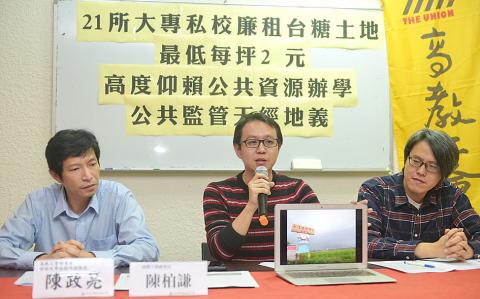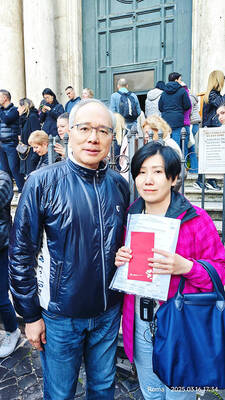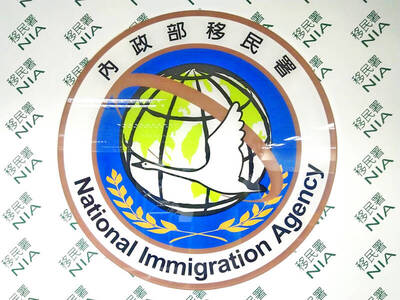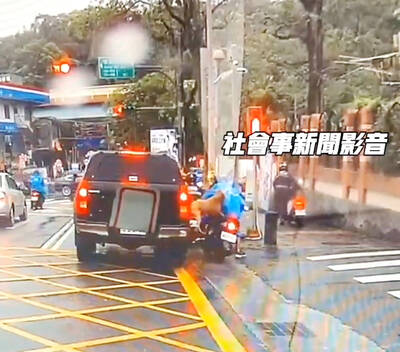Twenty-one private universities and colleges have been renting land from state-owned Taiwan Sugar Corp (Taisugar) for a monthly average of NT$7.6 (US$0.25) per ping (3.3m2), with some paying as little as NT$2.2 or NT$2.3 per ping, suggesting that private universities lack government oversight, the Taiwan Higher Education Union said yesterday.
The union has obtained details on 21 of 61 private universities and colleges that are renting land from the company at a preferential rate of 40 percent off the land’s market value as part a program designed to help schools, union researcher Chen Po-chien (陳柏謙) told a news conference in Taipei.
In more than 80 percent of the schools, more than 70 percent of the land belongs to Taisugar, he said, adding that three private universities — TransWorld University, Taiwan Shoufu University and Tzu Hui Institute of Technology — are entirely built on Taisugar land.

Photo: Chang Chia-ming, Taipei Times
The program has helped each private university save NT$20 million to NT$300 million over the past 50 years, he said, adding that the discount means that the universities profited NT$3.1 billion from government funds.
Given the discounted rent and other government subsidies granted to private universities, the Ministry of Education should increase supervision of school boards and ensure that publicly donated assets are returned to the government, parties or individuals when universities shut down, Chen said.
According to a bill to govern the transformation and closure of private universities and colleges approved by the Executive Yuan in 2017, a school board could maintain control over the school’s assets after it is transformed into a cultural or social welfare institute, he said.
While the bill has yet to pass a legislative review, the union fears it could encourage “irresponsible” school boards to deliberately close down universities to transform them into a more profitable business with government support, Chen said.
For example, the board of Yung Ta Institute of Technology and Commerce has continued to pay a yearly rent of NT$7 million to Taisugar after all faculty and students left following its closure in 2014, probably in an attempt to maintain control over the land and other public assets, he said.
“This is a double waste because the land could be put to better use if Taisugar were not renting it to the school, and the rent the school has been paying could have been used to pay the salaries it owed its teachers,” Chen said.
“In the near future, many private schools will shut down because of the declining birthrate. Their public assets should be immediately returned to local and central governments, and redistributed to schools that need them,” he said.
The ministry should also require the 21 universities to have representatives from civil groups, faculty and students on their board of directors to enhance supervision of their operations, he said, adding that teachers’ and students’ rights should be ensured when schools undergo closures or transformation.

A Taiwanese woman on Sunday was injured by a small piece of masonry that fell from the dome of St Peter’s Basilica in the Vatican during a visit to the church. The tourist, identified as Hsu Yun-chen (許芸禎), was struck on the forehead while she and her tour group were near Michelangelo’s sculpture Pieta. Hsu was rushed to a hospital, the group’s guide to the church, Fu Jing, said yesterday. Hsu was found not to have serious injuries and was able to continue her tour as scheduled, Fu added. Mathew Lee (李世明), Taiwan’s recently retired ambassador to the Holy See, said he met

A BETRAYAL? It is none of the ministry’s business if those entertainers love China, but ‘you cannot agree to wipe out your own country,’ the MAC minister said Taiwanese entertainers in China would have their Taiwanese citizenship revoked if they are holding Chinese citizenship, Mainland Affairs Council (MAC) Minister Chiu Chui-cheng (邱垂正) said. Several Taiwanese entertainers, including Patty Hou (侯佩岑) and Ouyang Nana (歐陽娜娜), earlier this month on their Weibo (微博) accounts shared a picture saying that Taiwan would be “returned” to China, with tags such as “Taiwan, Province of China” or “Adhere to the ‘one China’ principle.” The MAC would investigate whether those Taiwanese entertainers have Chinese IDs and added that it would revoke their Taiwanese citizenship if they did, Chiu told the Chinese-language Liberty Times (sister paper

The Chinese wife of a Taiwanese, surnamed Liu (劉), who openly advocated for China’s use of force against Taiwan, would be forcibly deported according to the law if she has not left Taiwan by Friday, National Immigration Agency (NIA) officials said yesterday. Liu, an influencer better known by her online channel name Yaya in Taiwan (亞亞在台灣), obtained permanent residency via marriage to a Taiwanese. She has been reported for allegedly repeatedly espousing pro-unification comments on her YouTube and TikTok channels, including comments supporting China’s unification with Taiwan by force and the Chinese government’s stance that “Taiwan is an inseparable part of China.” Liu

FATE UNKNOWN: The owner of the dog could face a fine of up to NT$150,000 and the animal could be euthanized if he cannot show that he can effectively supervise it A pit bull terrier has been confiscated by authorities after it yesterday morning bit a motorcyclist in Taipei, following footage of the same dog in a similar attack going viral online earlier this month. When the owner, surnamed Hsu (徐), stopped at a red light on Daan District’s (大安) Wolong Street at 8am, the dog, named “Lucky,” allegedly rolled down the automatic window of the pickup truck they were riding in, leapt out of the rear passenger window and attacked a motorcyclist behind them, Taipei’s Daan District Police Precinct said. The dog clamped down on the man’s leg and only let go